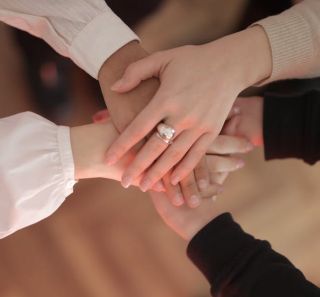Adverse Childhood Experiences
Finding an Anchor With a Strong Support Network
Adapting to — and thriving in — a changing world and keeping your peace.
Posted December 10, 2023 Reviewed by Abigail Fagan
Key points
- A strong support network can help us more easily glide through life’s ups and downs.
- In times of worrisome societal events, a support network may be even more important for our well-being.
- Those who have had traumatic childhoods may especially benefit substantially from a safe social network.

When our world is in upheaval — whether it’s dealing with a change in a home or work situation or listening to the latest news — many of us tend to close ranks around ourselves. We may batten down the hatches and close ourselves off from others. It’s safe and reassuring. But this is a time of change, in which occurrences around us and around the world don’t seem to make much sense.
From personal experience, I can tell you that when my world is turned upside down and my space seems like it’s being invaded, I often feel unsafe and threatened by it all. This may lead me to construct an emotional cement wall around myself. Sound familiar? Perhaps it’s time, though, that we smash down some of our personal over-protective walls and hold tighter to our loved ones, building a stronger support network, sometimes called “social capital”.
Rigorous Independence Isn't Always a Good Thing
I’ll admit it. I don’t like my space being invaded. And this may be common for people in the west. People in certain western countries – and the US in particular — often pride themselves on their independence. Moreover, with the COVID-19 pandemic’s introduction of physical distancing and stay-at-home measures, this so-called social independence was increased. We cannot discount the importance of precautions for the pandemic, but the pandemic and social distancing have also potentially exacerbated relationship issues in certain populations, particularly among young adults.

Adverse Childhood Experiences May Have Made Us Emotionally Guarded
Some of us may also have had childhoods that didn’t always feel emotionally safe, so we may have built up our emotional safety fences, only allowing in a few hand-picked loved ones through our strong wooden gate. Others of us may also have found safe coping methods when we were growing up, such as being around loving pets or time spent in nature to deal with what felt like an emotionally unsafe environment at home. Still others may have even erected a moat and drawbridge to make absolutely sure no unwanted outsiders snuck into our castle of safety. When uninvited individuals attempted to cross the perimeter, they may have even received a slight jolt from our protective electric fence. This emotional wall may have kept us feeling safe and secure in a world that didn’t always feel that way. While rigorous social and emotional independence could have served a purpose in the past, though, we may now be at a critical juncture in which we need to band together and lean into our support systems.

In fact, at some point there may be a massive shift in one’s life that requires adaptation to a changing world. How do we cope? Do we close ranks around ourselves and not allow anyone in or do we expand our safety net of social support so we can lean on each other? It may be a fork in the road that we don’t want to face, but for whatever reason (and whether we like it or not), that fork appears. With that “Y” in the road comes a decision to either isolate ourselves even further or to allow others in a bit more.
Becoming More Emotionally Available and Building a Support Network
Allowing others in emotionally can be frightening at times. I’m not going to lie to you and say it’s a piece of cake. But letting our boundaries down just a little at first may be rewarding in the long run. Friends — or friendly acquaintances — may be out there from whom we can learn and grow, and who may be there for us during the rough times in our lives. And let’s face it, there may be more challenging times in our future. So, let’s allow ourselves to be a little uneasy and even scared during the tough times, but let’s find safe people with whom we can be scared. Let’s prop each other up and be mutual leaning posts. For every situation in which we need a shoulder to cry on, there may also be a time when someone needs our shoulder’s support. Let’s open ourselves up just a little bit at a time, as scary as it may be, and build our network of support. We all need a safe support system, now more than ever. Let’s be there for one another.


